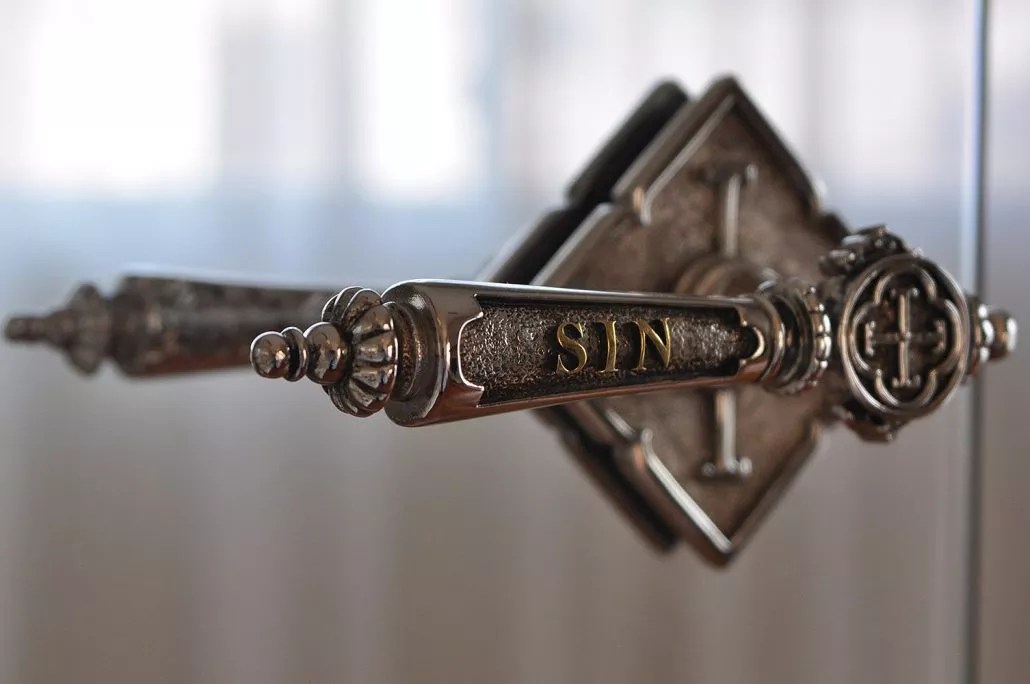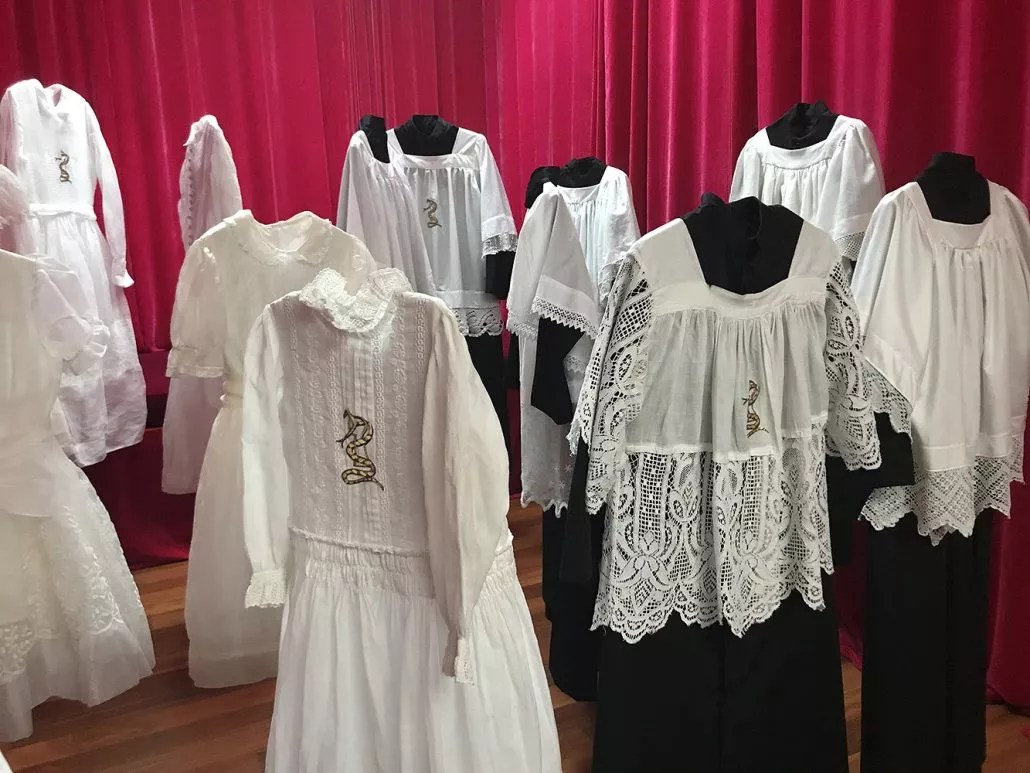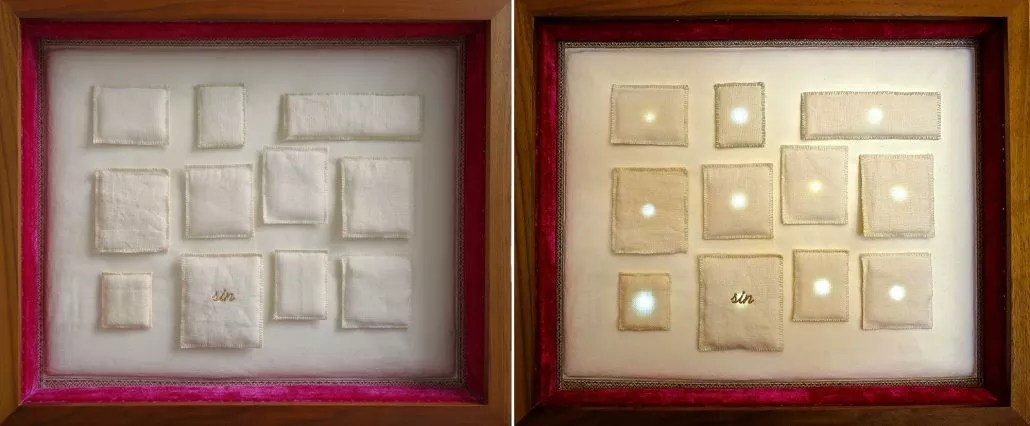
Lisa Sette Gallery

Audio By Carbonatix
Recently, news broke that the federal government is investigating allegations of sexual abuse by several Catholic priests in Pennsylvania. It’s the latest development in a story that spans several decades and countries, including Ireland.
That’s where Pope Francis addressed the issue in August. And it’s where Trina McKillen, a California-based artist with Irish roots, found inspiration for her “Confess” exhibition, which continues through Thursday, October 25, at Lisa Sette Gallery.
The exhibition calls the Catholic Church to account for its sins, while elevating the innocence of the children who fell prey to pedophile priests. It comprises three components, including a life-size confessional, with roles reversed so priests are the confessors.

Trina McKillen, Bless Me Child For I Have Sinned, 2010-2018, glass, marble, wood, nails, metal, nickel-plated composite, linen, plexiglass, 102 x 94 x 58 inches.
Lisa Sette Gallery
McKillen spent eight years creating the confessional, which she titled Bless Me Child For I Have Sinned. Its glass walls, which signal the need for radical transparency, provide a powerful counterpoint to the secrecy and shame that allows foul abuses against children to fester.
The confessional contains the traditional partition between priest and penitent, complete with latticed screen. Traditionally, a priest sits in a chair on one side of the partition, while a parishioner kneels on a padded platform facing the screen, and wooden walls provide privacy for those inside it.
But McKillen envisions a different type of confessional, in which a child sits atop a pristine white chair, hearing a confessor who kneels atop a platform covered in nails. Their points face upwards towards the heavens, as if to implicate not only those who’ve committed or hidden abuses against children, but also the God who allowed such a travesty to transpire.
Born in Belfast in 1964, McKillen grew up in an Irish Catholic family during the Troubles, a 30-year period of sectarian violence. Her mother was a devout Catholic, and her father an esteemed businessman who participated in secret peace negotiations with the British. Today, she recalls her childhood home being ransacked, and bombs exploding just outside their front door.
Another horror touched McKillen’s life as a teen, when she discovered a once-happy friend had become depressed – admitted to a psychiatric hospital in the aftermath of repeated sexual abuse by an uncle in the priesthood.

Trina McKillen, The Children, 2015-2018, 20 communion dresses, 20 altar boy vestments, Irish linen, thread, gold leaf, dimensions vary.
Lisa Sette Gallery
It’s an experience that informs her “Confess” exhibit, which also includes an installation titled The Children.
Created between 2015 and 2018, it comprises 20 communion dresses and 20 altar boy vestments, created with Irish linen, thread, and gold leaf. Each vintage garment, once worn by a Catholic child, has since been embellished by the artist with the symbol of a serpent winding its way through a keyhole.
In using this particular symbol, McKillen implicates the Vatican, the seat of power for the Catholic Church and its Pope, in the crimes of pedophile priests. Here, the artist couples the keyhole-shape design of the Vatican with the snake that symbolizes not only sin, but pure evil, and unabashedly indicts the church’s patriarchal power structure in the sexual abuse scandal it has yet to adequately address.
The garments are suspended from the ceiling with clear wire, and no human forms within them. Each one is unique, reflecting endless variations on the ways children have been traumatized by sexual abusers. Collectively, they reference the vast landscape of abuse by Catholic priests, making visible the innocent children they sought to silence.

Trina McKillen, Stations of Hope, 2008-2013, 14 pieces, linen, thread, nails, velvet, metallic ecclesiastic ribbon, embroidery, lights, dice, miniature plastic sheep, wood, dimensions vary.
Lisa Sette Gallery
The exhibition’s third element, comprising 14 framed sets of small objects including cloth pillow-like shapes the artist calls poultices, reflects the artist’s own mourning, not only for the children, but also for her mother, whose Catholic faith was gravely shaken after she learned of the abuse. It’s titled Stations of Hope, which references the Stations of the Cross, a Catholic devotion recounting 14 steps on Jesus’ journey from condemnation to the tomb.
From 2008 to 2013, while working to engineer her massive confessional, McKillen found herself hand-sewing the soft forms as a means of self-soothing, not certain they would ever serve another function. Along the way, she recognized their resemblance to poultices or bandages, and the way they could be lit to signify individual souls, as well as healing. They’re shown within a small, white cubicle inside the gallery, giving viewers a quiet, intimate space to reflect on not only the exhibition’s themes, but also the questions at its core.
“Confess.” On view through Thursday, October 25 at Lisa Sette Gallery, 210 East Catalina Drive; 480-990-7342; lisasettegallery.com. Gallery hours are 10 a.m. to 5 p.m. Tuesdays through Fridays and noon to 5 p.m. Saturdays. Free admission.